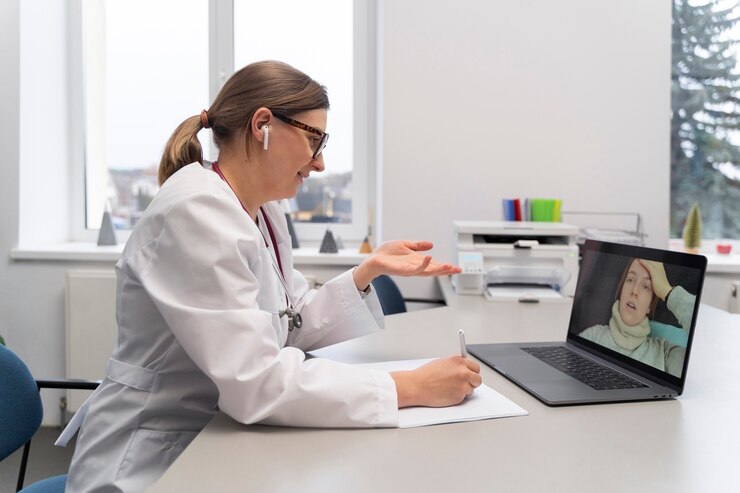The healthcare landscape is continuously evolving, driven by technological advancements and patient expectations. One of the most significant trends in this evolution is the emergence of virtual medical receptionists. These digital assistants stand to transform how healthcare facilities manage patient interactions, streamline administrative tasks, and enhance overall patient care. As we look towards the future, several key aspects highlight the potential impact of virtual medical receptionists in the healthcare sector. This article will delve into these aspects and explore the future of virtual medical receptionists in healthcare.
What are Virtual Medical Receptionists?
Virtual medical receptionists are digital assistants that use artificial intelligence (AI) and natural language processing (NLP) to interact with patients virtually. These advanced systems can handle various tasks, from scheduling appointments and managing patient data to answering basic inquiries and providing information about a healthcare facility’s services. They serve as an extension of traditional medical receptionists, offering 24/7 support and reducing the burden on administrative staff.
Current State of Virtual Medical Receptionists
The concept of virtual medical receptionists is relatively new, but it has gained
Improving Patient Access and Engagement
Virtual medical receptionists can significantly enhance patient access to healthcare services. By providing round-the-clock availability, these receptionists ensure patients can schedule appointments, request prescription refills, and receive guidance on healthcare services anytime. This level of accessibility is especially crucial for patients with rigid work schedules or those living in remote areas. Furthermore, by engaging patients proactively through reminders about upcoming appointments or wellness check-ins, virtual receptionists can significantly improve patient adherence to treatment plans and encourage preventive care.
Streamlining Administrative Processes
The administrative burden on healthcare staff has been a longstanding challenge. Virtual medical receptionists can alleviate much of this load by handling routine tasks such as answering frequently asked questions, managing appointment bookings, and collecting patient data. By automating these processes, healthcare facilities can free up valuable time for their staff, allowing them to focus more on patient care rather than administrative duties. The potential to reduce wait times and improve scheduling efficiency can lead to a more streamlined and effective healthcare delivery model.
Enhancing Communication
Effective communication is essential in healthcare between providers and patients and among healthcare teams. Virtual medical receptionists can facilitate this communication by serving as a bridge between patients and their healthcare providers. They can provide patients with critical information regarding their care plans and clarify doubts. Moreover, by integrating with electronic health record (EHR) systems, virtual receptionists can assist in ensuring that all team members are informed of any changes in patient status or care guidelines, thereby enhancing care coordination.
Personalization of Patient Experience
Personalizing the patient experience is becoming increasingly important in healthcare. Virtual medical receptionists can contribute to this personalization by leveraging patient data to tailor interactions. They can recognize returning patients, remember preferences, and offer customized information based on past interactions. This personalization improves patient satisfaction and fosters stronger patient-provider relationships, which can enhance patient loyalty and overall engagement with healthcare services.
Integration with Telehealth Services
The rise of telehealth services has reshaped how patients access care, particularly following the global pandemic. Virtual medical receptionists are integral to this shift, as they can manage telehealth appointment scheduling, provide patients with information on how to access virtual consultations and follow up with patients after their appointments. As telehealth continues to grow, the role of virtual receptionists will likely expand, creating a seamless experience for patients seeking both in-person and virtual care options.
Data Collection and Analysis
The future of healthcare lies in data-driven decision-making. Virtual medical receptionists will play a crucial role in collecting and managing patient data, helping healthcare providers better understand patient needs. By analyzing patterns in patient interactions, healthcare facilities can refine their services and address specific concerns that arise frequently. This data can be invaluable for improving operational efficiency and enhancing patient care strategies.
Cost-Effectiveness
Implementing virtual medical receptionists can lead to significant cost savings for healthcare facilities. Facilities can reduce overhead costs by reducing staffing needs for administrative functions and optimizing workflow processes. Moreover, the ability to handle a larger volume of patient interactions without a proportional increase in staffing can improve the bottom line. As more healthcare facilities recognize these financial benefits, the adoption of virtual receptionists is expected to increase.
Ensuring Compliance and Security
In an era where patient data security and regulatory compliance are paramount, virtual medical receptionists can assist in maintaining compliance with federal regulations, such as HIPAA. By projecting a professional and secure interaction front, these virtual assistants can help ensure patient data is managed responsibly. Furthermore, their ability to log interactions and data accurately can provide facilities with an audit trail that facilitates compliance verification.
Conclusion
The future of DocVA virtual medical receptionists in healthcare appears promising, potentially revolutionizing how healthcare is delivered. From improving patient access and engagement to streamlining administrative tasks and enhancing communication, these digital assistants are set to become valuable assets within healthcare settings. As technology advances, we can expect virtual medical receptionists to play an increasingly critical role in fostering a patient-centered approach, ensuring operational efficiency, and ultimately enhancing patient care quality. The journey towards fully integrating virtual receptionists into healthcare systems is just beginning, yet their impact is poised to be significant in shaping the future of healthcare delivery.
Additional:
- How To Develop A Solid Business Strategy?
- Demystifying Finance: A Beginner’s Guide to Understanding the Basics

